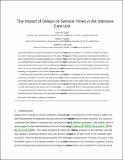The Impact of Delays on Service Times in the Intensive Care Unit
Author(s)
Chan, Carri W.; Escobar, Gabriel J.; Farias, Vivek F.
DownloadED2ICUdelay_2015.pdf (459.1Kb)
OPEN_ACCESS_POLICY
Open Access Policy
Creative Commons Attribution-Noncommercial-Share Alike
Terms of use
Metadata
Show full item recordAbstract
Mainstream queueing models are frequently employed in modeling healthcare delivery in a number of settings, and they further are used in making operational decisions for the same. The vast majority of these queueing models ignore the effects of delay experienced by a patient awaiting care. However, long delays may have adverse effects on patient outcomes and can potentially lead to a longer length of stay (LOS) when the patient ultimately does receive care. This work sets out to understand these delay issues from an operational perspective. Using data of more than 57,000 emergency department (ED) visits,we use an instrumental variable approach to empirically measure the impact of delays in intensive care unit (ICU) admission, i.e., ED boarding, on the patient's ICU LOS for multiple patient types. Capturing these empirically observed effects in a queueing model is challenging because the effect introduces potentially long-range correlations in service and interarrival times. We propose a queueing model that incorporates these measured delay effects and characterizes approximations to the expected work in the system when the service time of a job is adversely impacted by the delay experienced by that job. Our approximation demonstrates an effect of system load on work that grows much faster than the traditional 1/(1 - ρ) relationship seen in most queueing systems. As such, it is imperative that the relationship of delays and LOS be better understood by hospital managers so that they can make capacity decisions that prevent even seemingly moderate delays from causing dire operational consequences. Key words: Delay effects, queueing, Healthcare
Date issued
2016-05Department
Sloan School of ManagementJournal
Management Science
Publisher
Institute for Operations Research and the Management Sciences (INFORMS)
Citation
Chan, Carri W., Vivek F. Farias, and Gabriel J. Escobar. “The Impact of Delays on Service Times in the Intensive Care Unit.” Management Science 63, no. 7 (July 2017): 2049–2072.
Version: Author's final manuscript
ISSN
0025-1909
1526-5501